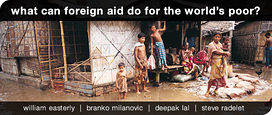One of the most innovative ideas in recent years of how to deliver aid more effectively is the Millennium Challenge Account. It is based on several sensible principles:
1. Choose countries with a demonstrated record (not promises) of decent governance and reasonable health, education, and economic policies;
2. Give those countries greater say in setting priorities and designing projects;
3. Provide them with larger amounts of money than other countries; and
4. Hold them accountable for achieving results.
The Administration was slow in getting the MCA off the ground, but the Millennium Challenge Corporation (MCC) has made reasonable progress since it was launched. It has operated substantially differently from other US aid programs in two areas: how it selects countries, and in allowing those countries to set priorities and design programs. In these two areas, the difference between the MCC and other agencies is night and day. The committed amounts of money are somewhat larger than other programs, albeit not at the scale originally envisaged.
The challenges going forward are the tough ones: implementation, monitoring and evaluation, and accountability. It remains to be seen whether or not the MCC will be more effective in these areas. Implementation is at an early stage. There have been some bumps along the road, and it is not always clear that the MCC has absorbed the key lessons from past aid programs. On M&E, the MCC is making progress in setting clearly defined, measurable performance targets. However, there is no true independent entity to measure progress against these goals. And the real acid test lies a year or two in the future: when a country fails to achieve its targets, will the MCC really reduce or redirect aid flows, or will it make excuses and coach countries along to keep the disbursements going? To make performance-based funding meaningful, the MCC and its political backers will have to be willing to demonstrate that they will cut off funding for non-performance and reward strong performance with continued finance for sound projects.

